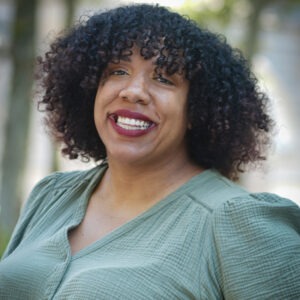 Additive is pleased to welcome Catherine Ntube as our new Senior Social Impact Writer. Since joining, Catherine has crafted messaging for a range clients including Columbia University School of Nursing, Foster America, and the Community Foundation of Louisville. Prior to Additive, Catherine spent 9 years in primary, intermediate and post-secondary writing classrooms where she helped students identify storytelling goals and techniques to achieve them in written and multimodal formats. She worked concurrently as a grant writer at Red Olive Culture Commons where she supported fundraising functions at Black arts organizations. Catherine graduated summa cum laude from Harvard University and holds an MFA in Creative Writing from the University of South Carolina.
Additive is pleased to welcome Catherine Ntube as our new Senior Social Impact Writer. Since joining, Catherine has crafted messaging for a range clients including Columbia University School of Nursing, Foster America, and the Community Foundation of Louisville. Prior to Additive, Catherine spent 9 years in primary, intermediate and post-secondary writing classrooms where she helped students identify storytelling goals and techniques to achieve them in written and multimodal formats. She worked concurrently as a grant writer at Red Olive Culture Commons where she supported fundraising functions at Black arts organizations. Catherine graduated summa cum laude from Harvard University and holds an MFA in Creative Writing from the University of South Carolina.
We sat down with Catherine to learn more about the causes that matter most to her, and how to think like a poet.
What drew you to Additive?
Family drew me back to NYC and I prioritized three things as I was thinking about the next chapter of my career. I wanted to be doing impact driven work; I wanted a role that would allow a sense of intellectual and creative curiosity — my family teases me that if I could be a professional student I would; and I wanted to be writing.
I wasn’t looking into branding specifically, but was drawn to Additive by the job title. “Social Impact Writer” felt directly aligned with my goals, yes, but also spoke to Additive’s priorities in a way that gave me pause and invited me to consider a pathway I hadn’t before. And it’s ended up feeling like a really good fit. I’m getting to learn the styles and structures of writing in a new field and I’m learning and thinking about different modes of social change as I work with different clients, so the curiosity box is ticked as well.
What causes are important to you right now?
Always and forever education. I think sometimes people center education as a more politically neutral way to “do good” while avoiding tackling other issues — economic disparity, housing insecurity. I don’t think education is a magic cure all for, say, eradicating poverty — there’s a lot of other systems in place that need to be addressed as well. But ensuring people have access to a quality education is so important. And I don’t think education is or should be politically neutral. At its best, it’s aligned with justice and liberation, and prepares people to do the work of living in community and ending oppression.
And racial justice is a constant for me too. Thinking and reading about racial justice shaped my outlook on life from an early age. Black thinkers, authors, activists like Audre Lorde, MLK, Toni Morrison, Baldwin, Du Bois—they gave me my first set of vocabulary for thinking about justice and social change.
How can regular people think more like poets?
I think a big part of it is being willing to experiment, moving beyond the most surface or literal way of seeing something. A sort of opening up and playing around.
Craft-wise, poetry can feel like an exercise in distillation — trying to capture an experience and distill it into the smallest container. It can also be an exercise in musicality or abstraction. And poetry also feels sometimes like an exercise in practicing failure. Since poems are often trying to translate into language or image something that’s difficult to express, it can feel impossible to fully capture. But there’s still something lovely and worthy in the attempt, something magic in how close you get, or surprising in the way you get there.
I think poetry, for a lot of people, feels like poets are just trying to say something in the most difficult way. Poems are often taught as a mystery to be solved, and there’s something to be said for reading beyond the surface. But what feels most powerful about a poetic mind to me isn’t about shrouding experiences in mystery and making them difficult to relate to or understand, it’s actually about the opposite: trying to express something that isn’t fully speakable, but that you want to share.